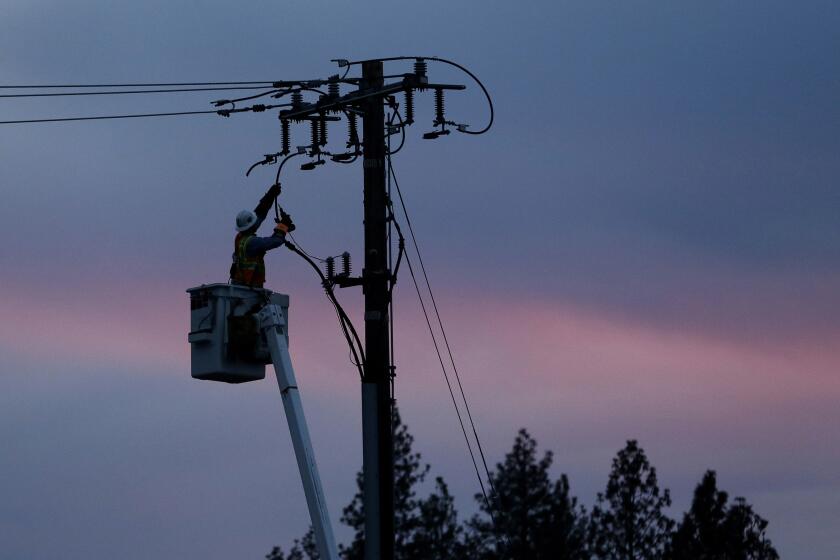
- Share via
Ignoring hundreds of complaints by electricity customers from across the state, the California Public Utilities Commission voted unanimously Thursday to fundamentally change how electricity is billed by adding a new monthly fixed fee.
In return for paying a mandatory $24.15 fee each month, consumers will pay a lower rate for each kilowatt of power they use.
The commissioners, who are appointed by the governor, sided with the state’s three largest utilities by approving the proposal. They said by lowering the rate per kilowatt hour it will encourage more people to buy electric cars and replace gas appliances in their homes, which would reduce the use of planet-warming fossil fuels.
The change affects customers of investor-owned power companies, such as Pacific Gas & Electric, Southern California Edison and San Diego Gas & Electric. It does not apply to customers of the Los Angeles Department of Water and Power or other municipal utilities.
With little public debate, state lawmakers passed a complex energy bill that upended how most Californians are billed for electricity.
The decision was criticized by some lawmakers from both parties, as well as a coalition of more than 250 consumer and other groups, who say millions of Californians living in small homes and apartments who are low users of electricity will now subsidize households that are heavy power users.
Waving signs that said, “Protect Working People” and “Protect Renters,” dozens of coalition members opposed to the fee protested in front of the building where commissioners were meeting.
“This will punish people who use less energy,” said Jenn Engstrom, the state director at consumer advocacy group CalPIRG. “This will encourage high consumption and it will increase bills for millions of Californians.”
Commissioner John Reynolds dismissed the concerns before he voted for the proposal. “The public discourse has been disappointing,” he said.
He agreed that under the change some customers’ total bills will go up, while others will see a decline. But the focus, he said, should be on the reduction in the rate per kilowatt hour, which is needed as the state tries to move more people away from fueling their cars and homes with fossil fuels to electricity, which is increasingly coming from wind and solar farms.
“We can reduce our greenhouse gas emissions as a state,” he said.
The commission was acting to approve the details and amount of the new fixed fee to comply with a 2022 law known as Assembly Bill 205.
Gov. Gavin Newsom proposed AB 205 as part of his budget on June 26, 2022. Lawmakers approved the bill and Newsom signed it in a few days with little public discussion.
PG&E had asked the commission for the new monthly fee in a regulatory filing just three months before AB 205’s approval.
The bill eliminated the $10 cap on fixed charges that had been in place since 2013 and opponents say there is little to prevent the utilities from raising it higher.
The law also required the fee to progressively increase based on the household’s income.
Last year, PG&E, Edison and SDGE proposed monthly fees as high as $128 for the wealthiest households. The companies asked that a state agency collect and verify each electric customer’s income.
Danielle Wall has transformed how locals interact with rattlesnakes. Her work has earned her a front-row seat to reshaping of California’s High Desert.
The commission rejected the companies’ proposal and offered its own this spring. Lower-income households already enrolled in programs giving them discounts on their electric bills will pay a lower monthly fee than $24.15.
Households of one or two people earning less than $39,440 will pay $6 a month. Those who earn more than that but less than $62,150 a year will pay a monthly fee of $12.
The commission said the change is designed not to generate extra profits for the electric companies. Instead it moves some of the costs of maintaining electric lines and protecting the grid from wildfires into the new fixed charge.
The new monthly charges will begin in late 2025 for customers of SoCal Edison and SDGE. PG&E customers will see the change in bills beginning in 2026.
The commission estimates that a household that powers all home appliances and a vehicle with electricity will save an average of $28 to $44 a month compared with the current billing structure.
Savings will increase as people use more electricity.
Flagstaff Research, which conducted an analysis for opponents, estimated that about 4 million households that use low levels of electricity, including many apartment renters, would pay $65 to $225 more a year under the new rate structure.
At the same time, those in big houses using greater amounts of power will save hundreds of dollars a year, the analysis found.
After the vote, three Republican state senators called the proposal poorly constructed and flawed.
“All this does is put a bigger burden on working families that are already dealing with the repercussions of unrealistic energy policies that make California unaffordable,” said caucus Chair Kelly Seyarto (R-Murrieta).
Assemblymember Jacqui Irwin (D-Thousand Oaks) this week amended her bill called AB 1999, which she proposed in January to reverse much of Newsom’s 2022 law that imposed the fixed charges.
Irwin’s amended bill would keep the fixed rate from rising faster than inflation and repeal it at the end of 2028.
“A system that promotes high energy consumption could increase the entire grid’s costs and lead to higher electricity bills for everyone,” said Engstrom at CalPIRG. “We’re looking to the state Legislature to act to reverse this bad policy and prevent more proposals like this in the future.”
Toward a more sustainable California
Get Boiling Point, our newsletter exploring climate change, energy and the environment, and become part of the conversation — and the solution.
You may occasionally receive promotional content from the Los Angeles Times.









